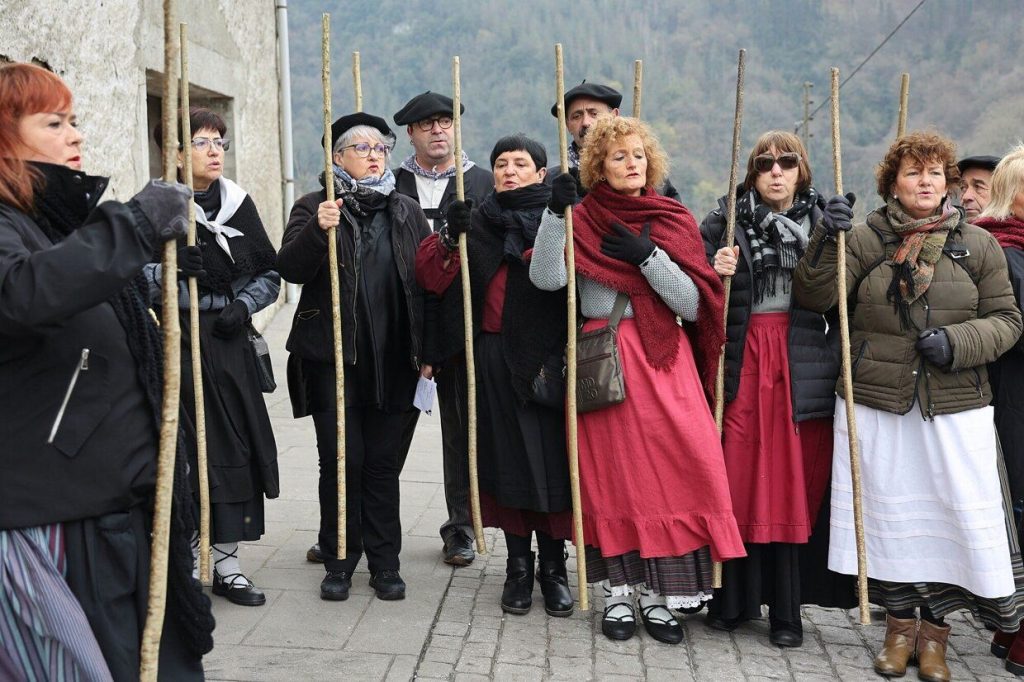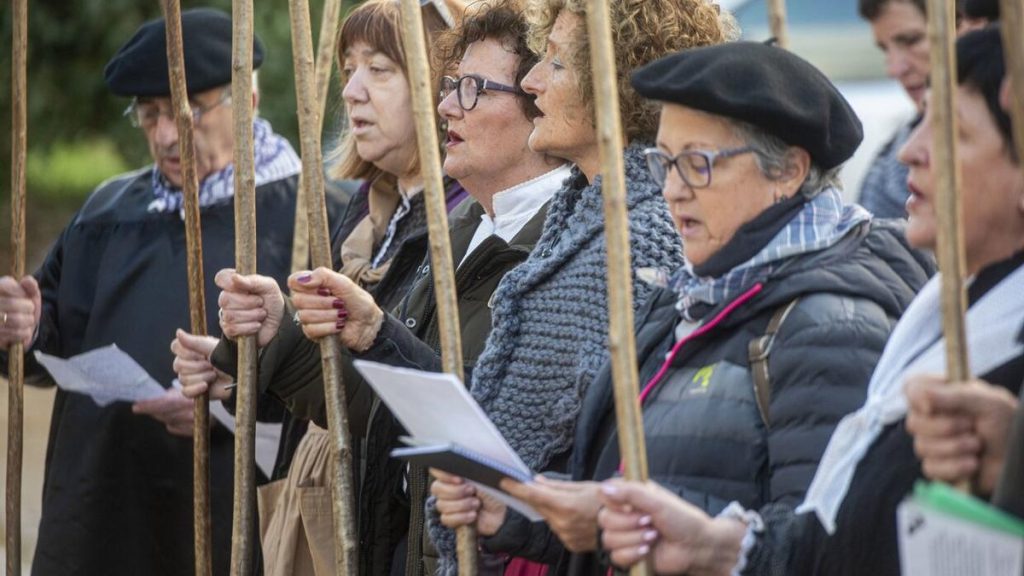One of the most important Basque Traditions is Santa Agueda (Agate Deuna in Basque), and the Catholic Church commemorates this feast on February 5th. In popular tradition, this celebration begins on the eve, that is, the late evening of February 4th. The eve of Santa Águeda is a significant event in numerous towns across the Basque Country, where choirs and groups roam the streets, singing in honor of the saint and accompanying their songs with sticks and canes called «makilas», rhythmically striking the ground.
Santa Agueda: The Women Protector
Santa Águeda, also known as Águeda de Catania, and revered for her bravery and martyrdom, has become a symbol of strength and protection in Basque culture. Her story resonates deeply, especially among women, for her unwavering stand against oppression and her sacrifices for faith and dignity.
Furthermore, the eve of Santa Águeda is not just a night of music and tradition, but a powerful homage to the protector of women, embodying the collective prayer for safety, fertility, and the well-being of families. As groups sing and march through the streets, their rhythmic beats on the ground echo the community’s reverence and invocation of Santa Águeda’s blessings, making it a profoundly moving celebration of solidarity, courage, and cultural identity.
The Origin of the Tradition: Why do Basques celebrate «Santa Agueda»?
This tradition might have its roots in Basque mythology, with the clash of «makilas» being a «call to the earth», to fully awaken after the winter solstice. However, this celebration combines both pagan and Christian elements.
Moreover, the Sicilian virgin and martyr from the 3rd century, Santa Águeda, was sentenced to have her breasts cut off for rejecting the tyrant Quinciano. Since then, she has been the patron saint of women and fertility, a beacon of hope for many expectant mothers. Numerous powers are attributed to her: preventing fires and volcanic eruptions, protecting against evil spirits and livestock diseases, and enhancing agricultural production. Basque tradition also credits her with the ability to cure headaches and migraines, showcasing her as a figure of immense benevolence and protection.
What did «Santa Agueda» do?
Santa Águeda’s legacy is one of extraordinary courage and sacrifice. In the face of unimaginable torment, she stood firm in her faith and convictions, refusing to succumb to the demands of her oppressor. Her ordeal and the miraculous interventions attributed to her following her martyrdom have inspired countless believers. Her story is not merely a tale of suffering; it is a narrative of triumph over adversity. It embodies the virtues of resilience, faith, and the power of divine intervention. The veneration of Santa Águeda goes beyond remembering her as a martyr. It is a celebration of her enduring spirit and the protective mantle she extends over those who invoke her name.

A Beacon of Female Empowerment and Feminist Resilience
Following her steadfast refusal to yield to Quinciano’s advances, Santa Águeda was subjected to brutal punishment, ultimately leading to her death. Her martyrdom, particularly the barbaric act of having her breasts cut off, has since been emblematic of the extreme violence women have faced through the ages for asserting their autonomy and rejecting subjugation. In the years following her death, Santa Águeda’s story has transcended its origins to become a powerful feminist symbol.
Moreover, It resonates with the ongoing struggle against gender-based violence and the oppression of women, serving as a beacon of resistance and empowerment. Her unwavering spirit and sacrifice continue to inspire, not only those who seek her protection and intercession but also those who champion women’s rights and dignity across the world. Santa Águeda’s story is a poignant reminder of the resilience and strength inherent in women; making her an enduring figure of female empowerment and feminist ideals.
Don’t miss the Santa Águeda Pilgrimage
Among the pilgrimages held in her honor, three stand out at the Sanctuary of Santa Águeda in Kastrexana (Barakaldo): the first on February 5th, another on the preceding Sunday, and the last on the following Sunday, attracting thousands. These gatherings are not just spiritual journeys; they are vibrant celebrations of community, faith, and Basque cultural heritage.
Discover More Basque Traditions alongside with Basqvium
Dive deeper into the heart of Basque traditions and join us to «Learn more about Basque traditions with Basqvium.» Experience the rich tapestry of history, faith, and culture that shapes the Basque Country.
From the solemnity of Santa Águeda’s pilgrimage to the joyful celebration of her eve, Basqvium offers you a gateway to exploring and understanding the profound meanings behind these cherished traditions.
Don’t let this opportunity pass—immerse yourself in unique cultural experiences alongside with Basqvium.

